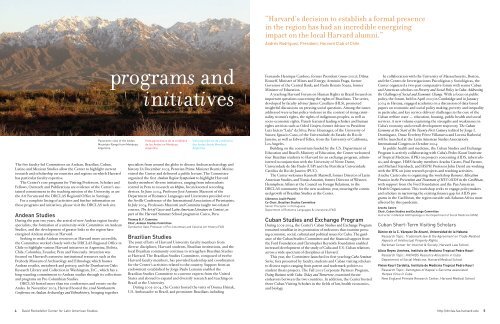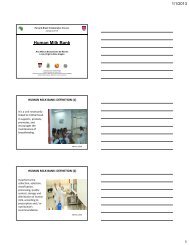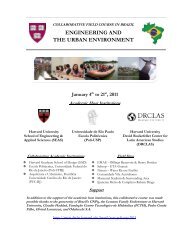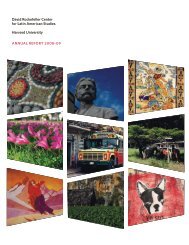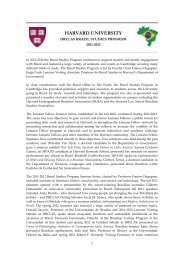Create successful ePaper yourself
Turn your PDF publications into a flip-book with our unique Google optimized e-Paper software.
4 David Rockefeller Center for Latin American Studies<br />
programs and<br />
initiatives<br />
Panoramic view of the Andes<br />
Mountain Range from Mendoza,<br />
Argentina.<br />
The five faculty-led Committees on Andean, Brazilian, Cuban,<br />
Latino and Mexican Studies allow the Center to highlight current<br />
research and scholarship on countries and regions on which Harvard<br />
has particular faculty expertise.<br />
The Center’s core programs for Visiting Professors, Scholars and<br />
Fellows, Outreach and Publications are evidence of the Center’s sustained<br />
commitment to the teaching mission of the University, as are<br />
the Art Forum and the DRCLAS Regional Office in Santiago.<br />
For a complete listing of activities and further information on<br />
these programs and initiatives, please visit the DRCLAS web site.<br />
Andean Studies<br />
During the past two years, the arrival of new Andean region faculty<br />
specialists, the formation of a university-wide Committee on Andean<br />
Studies, and the development of greater links to the region have<br />
energized Andean studies at Harvard.<br />
Seeking to make Andean resources at Harvard more accessible,<br />
the Committee worked closely with the DRCLAS Regional Office in<br />
Chile to highlight various Harvard initiatives in Argentina, Bolivia,<br />
Chile, Colombia, Ecuador, Peru and Venezuela. Attention was<br />
focused on Harvard’s extensive institutional resources such as the<br />
Peabody Museum of Archaeology and Ethnology, which houses<br />
Andean textiles, metalwork and pottery, and the Dumbarton Oaks<br />
Research Library and Collection in Washington, D.C., which has a<br />
long-standing commitment to Andean studies through its collections<br />
and programs on Pre-Columbian Studies.<br />
DRCLAS hosted more than ten conferences and events on the<br />
Andes. In November 2003, Harvard hosted the 22nd Northeastern<br />
Conference on Andean Archaeology and Ethnohistory, bringing together<br />
Vista panorámica de la cordillera<br />
de los Andes en Mendoza,<br />
Argentina.<br />
Vista panorâmica da cordilheira<br />
dos Andes desde Mendoza,<br />
Argentina.<br />
specialists from around the globe to discuss Andean archaeology and<br />
history. In December 2003, Peruvian Prime Minister Beatriz Merino<br />
visited the Center and delivered a public lecture. The Committee<br />
organized the first Andean Region Symposium to highlight Harvard<br />
faculty members’ diverse initiatives, ranging from tuberculosis<br />
control in Peru to research on khipus, Incan knotted recording<br />
devices. In June 2004, Professor José Antonio Mazzotti of the<br />
Department of Romance Languages and Literatures presided over<br />
the Seville Conference of the International Association of Peruvianists.<br />
In July 2004, Professors Mazzotti and Cummins taught two related<br />
courses, The Art of Cuzco and Latin American Literature in Context, as<br />
part of the Harvard Summer School program in Cuzco, Peru.<br />
Thomas B. F. Cummins<br />
Chair, Andean Studies Committee<br />
Dumbarton Oaks Professor of Pre-Columbian and Colonial Art History (FAS)<br />
Brazilian Studies<br />
The joint efforts of Harvard University faculty members from<br />
diverse disciplines, Harvard students, Brazilian institutions, and the<br />
local Brazilian community continue to strengthen Brazilian Studies<br />
at Harvard. The Brazilian Studies Committee, composed of twelve<br />
Harvard faculty members, has provided leadership and coordination<br />
for the Center’s activities related to the country. Support from an<br />
endowment established by Jorge Paulo Lemann enabled the<br />
Brazilian Studies Committee to convene experts from the United<br />
States and abroad to expand and diversify research and teaching on<br />
Brazil at the University.<br />
During 2003-2004, the Center hosted the visits of Donna Hrinak,<br />
U.S. Ambassador to Brazil, and prominent Brazilians including<br />
“Harvard’s decision to establish a formal presence<br />
in the region has had an incredible energizing<br />
impact on the local Harvard alumni.”<br />
Andrés Rodríguez, President, Harvard Club of Chile<br />
Fernando Henrique Cardoso, former President (1999-2002); Dilma<br />
Rouseff, Minister of Mines and Energy; Arminio Fraga, former<br />
Governor of the Central Bank; and Paulo Renato Souza, former<br />
Minister of Education.<br />
A yearlong Harvard Forum on Human Rights in Brazil focused on<br />
important questions concerning the rights of Brazilians. The series,<br />
developed by faculty adviser James Cavallaro (HLS), promoted<br />
insightful discussions on pressing social questions. Among the issues<br />
addressed were urban police violence in the context of rising criminality,<br />
women’s rights, the rights of indigenous peoples, as well as<br />
socio-economic rights. Panels featured leading scholars and human<br />
rights activists such as Oded Grajew, former Advisor to President<br />
Luiz Inácio “Lula” da Silva; Peter Houtzager, of the University of<br />
Sussex; Ignacio Cano, of the Universidade do Estado do Rio de<br />
Janeiro; as well as Edward Telles, from the University of California,<br />
Los Angeles.<br />
Building on the consortium funded by the U.S. Department of<br />
Education and Brazil’s Ministry of Education, the Center welcomed<br />
four Brazilian students to Harvard for an exchange program, administered<br />
in conjunction with the University of Notre Dame,<br />
Universidade de São Paulo (USP) and the Pontifícia Universidade<br />
Católica do Rio de Janeiro (PUC).<br />
The Center welcomes Kenneth Maxwell, former Director of Latin<br />
American Studies, and Tomás Amorim, former Director of Western<br />
Hemisphere Affairs at the Council on Foreign Relations, to the<br />
DRCLAS community for the new academic year, ensuring the continued<br />
growth of Brazilian Studies at the Center.<br />
Clémence Jouët-Pastré<br />
Co-Chair, Brazilian Studies Committee<br />
Senior Preceptor in Portuguese<br />
Department of Romance Languages & Literatures (FAS)<br />
Cuban Studies and Exchange Program<br />
During 2003-2004, the Center’s Cuban Studies and Exchange Program<br />
remained stead<strong>fas</strong>t in its promotion of endeavors that examine pressing<br />
economic, social, cultural and political issues for Cuba. The guidance<br />
of the Cuban Studies Committee and the financial support from<br />
the Ford Foundation and Christopher Reynolds Foundation enabled<br />
increased development of the study of Cuba and U.S.-Cuban relations<br />
across a wide spectrum of disciplines at Harvard.<br />
This year, the Committee launched its first yearlong Cuba Seminar<br />
Series, fora presented by faculty, students and Cuban visiting scholars<br />
to discuss topics ranging from patent and trademark policies to<br />
student thesis projects. The Fall 2003 Corporate Partners Program,<br />
Doing Business with Cuba: Today and Tomorrow, examined future<br />
endeavors between the two countries. In addition, the Center hosted<br />
three Cuban Visiting Scholars in the fields of law, health economics,<br />
and biology.<br />
In collaboration with the University of Massachusetts, Boston,<br />
and the Centro de Investigaciones Psicológicas y Sociológicas, the<br />
Center organized a two-part comparative forum with senior Cuban<br />
and American scholars on Poverty and Social Policy in Cuba: Addressing<br />
the Challenges of Social and Economic Change. With a focus on public<br />
policy, the forum, held in April 2003 in Cambridge and in January<br />
2004 in Havana, engaged academics in a discussion of data-based<br />
papers on economic and social policy making, poverty and inequality<br />
in particular, and key service delivery challenges in the core of the<br />
Cuban welfare state — <strong>edu</strong>cation, housing, public health and social<br />
services. A new volume examining the strengths and weaknesses in<br />
Cuba’s economy and overall development trajectory, The Cuban<br />
Economy at the Start of the Twenty-First Century (edited by Jorge I.<br />
Domínguez, Omar Everleny Pérez Villanueva and Lorena Barberia)<br />
will be launched at the Latin American Studies Association’s<br />
International Congress in October 2004.<br />
In public health and medicine, the Cuban Studies and Exchange<br />
Program is actively collaborating with Cuba’s Pedro Kourí Institute<br />
of Tropical Medicine (IPK) on projects concerning AIDS, tuberculosis,<br />
and dengue. HMS faculty members Arachu Castro, Paul Farmer,<br />
and Michael Starnbach, and HSPH Professor John David are working<br />
with the IPK on joint research projects and teaching activities.<br />
Arachu Castro also is organizing the workshop Resource Allocation<br />
Practices in the Prevention and Treatment of HIV/AIDS in the Caribbean,<br />
with support from the Ford Foundation and the Pan American<br />
Health Organization. This workshop seeks to engage policymakers<br />
and scholars in narrowing the existing finance gap for AIDS programs<br />
in the Caribbean, the region outside sub-Saharan Africa most<br />
affected by this pandemic.<br />
Arachu Castro<br />
Chair, Cuban Studies and Exchange Committee<br />
Instructor in Medical Anthropology in the Department of Social Medicine (HMS)<br />
Cuban Short-Term Visiting Scholars<br />
Dánice de la C. Vázquez De Alvaré, Universidad de la Habana<br />
Research Topic: Trademark law & the Agreement on Trade-Related<br />
Aspects of Intellectual Property Rights<br />
Berkman Center for Internet & Society, Harvard Law School<br />
Alicia Reyes Jiménez, Instituto de Medicina Tropical Pedro Kourí<br />
Research Topic: HIV/AIDS Resource Allocation in Cuba<br />
Department of Social Medicine, Harvard Medical School<br />
Vivian Kourí Cardella, Instituto de Medicina Tropical Pedro Kourí<br />
Research Topic: Genotypes of Kaposi’s Sarcoma associated<br />
Herpes Virus in Cuba<br />
New England Primate Research Center, Harvard Medical School<br />
<strong>http</strong>://<strong>drclas</strong>.<strong>fas</strong>.<strong>harvard</strong>.<strong>edu</strong> 5


